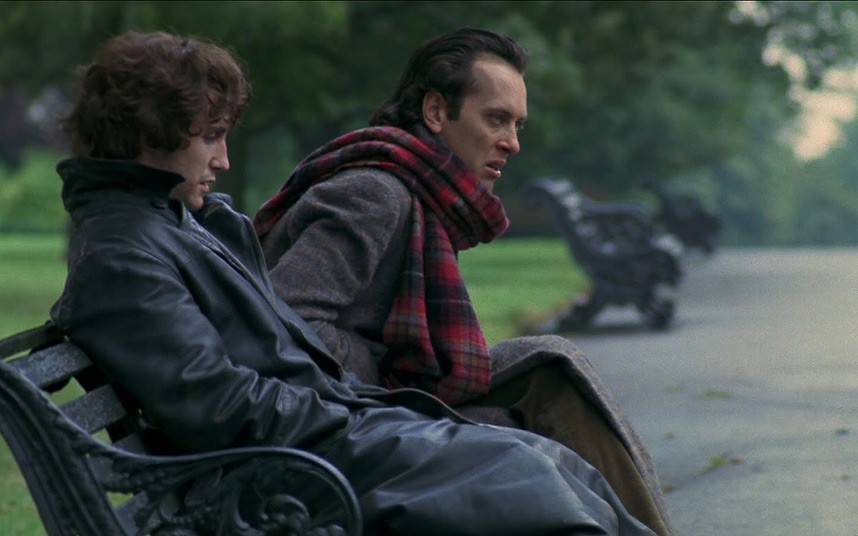 When we’re out and about I regularly call my wife a ‘terrible c**t’ and with equal nonchalance and regularity she addresses me as a ‘perfumed ponce’. For those not in on the joke it must appear dysfunctional at best and downright inappropriate at worst. Especially when we’re lighting candles in church. (Actually we haven’t set foot inside a church together since our wedding day. The temptation to shout ‘scrubbers’ at nuns would be too great, for both of us.) But if people disapprove of our foul-mouthed antics that is their problem. They obviously haven’t seen ‘Withnail and I‘ and therefore do not matter. We are not to blame for these outbursts. The real culprit is writer/director Bruce Robinson and a script that is so full of incendiary one liners that the viewer must immediately go out in public and shout them at an uncaring world. ‘Throw yourself into the road darling, you haven’t got a chance!’ (me at my niece’s nativity play), ‘Here, Hare Here’ (when I get served a steak in a restaurant), and, my favourite, ‘I fuck arses, who fucks arses?’ (every time my wife reverses the car). The simple pleasure of throwing these lines into the mundane ‘arena of the unwell’, removed of context or logic, is surely why this film is still so admired and quoted.
When we’re out and about I regularly call my wife a ‘terrible c**t’ and with equal nonchalance and regularity she addresses me as a ‘perfumed ponce’. For those not in on the joke it must appear dysfunctional at best and downright inappropriate at worst. Especially when we’re lighting candles in church. (Actually we haven’t set foot inside a church together since our wedding day. The temptation to shout ‘scrubbers’ at nuns would be too great, for both of us.) But if people disapprove of our foul-mouthed antics that is their problem. They obviously haven’t seen ‘Withnail and I‘ and therefore do not matter. We are not to blame for these outbursts. The real culprit is writer/director Bruce Robinson and a script that is so full of incendiary one liners that the viewer must immediately go out in public and shout them at an uncaring world. ‘Throw yourself into the road darling, you haven’t got a chance!’ (me at my niece’s nativity play), ‘Here, Hare Here’ (when I get served a steak in a restaurant), and, my favourite, ‘I fuck arses, who fucks arses?’ (every time my wife reverses the car). The simple pleasure of throwing these lines into the mundane ‘arena of the unwell’, removed of context or logic, is surely why this film is still so admired and quoted.
Produced by George Harrison’s ‘Handmade’ film company and shot mainly in Sleddle Hall, Cumbria, in August 1986, the story concerns a bid by two ‘resting’ actors to rejuvenate themselves in the countryside. That they have made a mistake with this holiday soon becomes apparent as they utterly fail to find food, fuel or relaxation. A altercation with a local poacher, Jake (played memorably by the brilliant Michael Elfick) creates an atmosphere of menace and panic. The viewer could be forgiven for assuming that this dark comedy might turn into a Straw Dogs-type blood bath. Their saviour comes in the form of Uncle Monty (Richard Griffiths) an ageing sexual predator and the house’s owner. For the disreputable Withnail (a role which Richard E. Grant would never better) this family reunion is rather welcome as Monty ‘keeps an excellent cellar’, but for Paul McGann‘s Marwood (the eponymous ‘I’) this unexpected visit presages an uncomfortable fight to avoid being raped.
Light-hearted stuff, right? Well yes and no. But this is dark humour at its most accomplished. So many writers and directors have attempted the ‘darkly comical’ and indeed the genre as a whole seems to be experiencing a renaissance (Birdman) but they rarely hit the sweet spot. For every ‘Nuts in May’ there seems to be a hundred other pretenders that are just faintly funny and vaguely dark. (Insert free publicity to mediocrity here.)
Withnail and I, for all its grotesque, bacchanalian debauchery still warms and delights audiences because at its heart is a universal theme. It is the precisely the reason I am so happy to repeat its idiosyncratic c-bombs with a clear conscience. Moving on and growing-up in-spite of our worst natures is the thread that holds this faded but nevertheless glorious tapestry together. Withnail’s closing speech in Regent’s Park is the film’s most poignant moment. The viewer is left to ponder what will become of this petulant, spoiled, impoverished and damaged character. And the director doesn’t tell us because we need to work it out for ourselves.
Now, I’ll have two large gins, and two pints of cider, ice in the cider.
Words by Raymond Duck